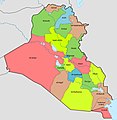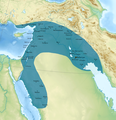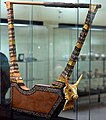The Iraq PortalA view of Baghdad, Iraq
Iraq, officially the Republic of Iraq, is a country in West Asia and in the geopolitical region known as the Middle East. With a population of over 46 million, it is the 14th-most populous country on the Asian continent and the 33rd-most populous country in the world. It is a federal parliamentary republic that consists of 18 governorates. The country is bordered by Turkey to the north, Iran to the east, the Persian Gulf and Kuwait to the southeast, Saudi Arabia to the south, Jordan to the southwest, and Syria to the west. The capital and largest city is Baghdad. The Iraqi people are diverse, with similarly diverse geography and wildlife. As part of the Arab and Muslim world, most Iraqis are Muslims – minority faiths include Christianity, Yazidism, Mandaeism, Yarsanism, and Zoroastrianism. The official languages of Iraq are Arabic and Kurdish; others also recognized in specific regions are Turkish (Turkmen), Suret (Assyrian), and Armenian. Modern Iraq dates to 1920, when the British Mandate for Mesopotamia was created under the authority of the League of Nations. A British-backed monarchy was established in 1921 under Faisal. The Hashemite Kingdom of Iraq gained independence from the UK in 1932. In 1958, the monarchy was overthrown and the Iraqi Republic created. Iraq was ruled by the Arab Socialist Ba'ath Party from 1968 until 2003, led by Ahmad Hassan al-Bakr and then by Saddam Hussein, as a one-party state. Iraq invaded Iran in 1980, sparking a protracted war that ended as a stalemate in 1988, with devastating losses for both sides. In 1990, Iraq invaded Kuwait, leading to global condemnation and a military campaign waged by a US-led international coalition that expelled Iraqi forces from Kuwait. A 2003 invasion launched by another US-led coalition as part of its "Global War on Terror" resulted in the defeat of Ba'athist Iraq and the execution of Saddam Hussein. Discontent with the de-Ba'athification policies of the Provisional Authority stirred up an anti-American insurgency, which escalated into a sectarian civil war. In 2005, a new constitution was adopted and multi-party parliamentary elections were held in Iraq. The Withdrawal of US troops from Iraq began in 2008, and the American occupation officially ended in 2011. Continued repression and sectarian policies of Nouri al-Maliki's Shia government caused the 2012–13 Iraqi protests, after which a coalition of Ba'athist and Sunni militias took up arms during the 2013 Anbar campaign. The climax of the campaign was the Northern Iraq offensive by the Islamic State group that marked its rapid territorial expansion, prompting the return of American troops to fight the War in Iraq, which lasted until 2017. Iran has also intervened in Iraq since 2014, expanding its influence through sectarian parties and Khomeinist militia groups, triggering widespread protests in Iraq. (Full article...) Selected article -Al-Quwa Al-Jawiya (Arabic: نادي القوة الجوية الرياضي, lit. 'Air Force Sports Club') is an Iraqi sports club based in Rusafa District, Baghdad that competes in the Iraq Stars League, the top-flight of Iraqi football. Founded in 1931, it is the oldest existing club in Iraq. Its football team is one of the most successful in Iraq having won seven Iraq Stars League titles, most recently in the 2020–21 season, while they won their sixth Iraq FA Cup title in 2023. The club also won a joint-record three Umm al-Ma'arik Championships as well as two Iraqi Super Cups, and in the 1996–97 season they became the first of only two clubs to win all four major national trophies in the same season. (Full article...)Selected pictureKufa Mosque Did you know...
Selected biography -Dame Zaha Mohammad Hadid DBE RA (Arabic: زها حديد Zahā Ḥadīd; 31 October 1950 – 31 March 2016) was an Iraqi-British architect, artist and designer, recognized as a major figure in architecture of the late-20th and early-21st centuries. Born in Baghdad, Iraq, Hadid studied mathematics as an undergraduate and then enrolled at the Architectural Association School of Architecture in 1972. In search of an alternative system to traditional architectural drawing, and influenced by Suprematism and the Russian avant-garde, Hadid adopted painting as a design tool and abstraction as an investigative principle to "reinvestigate the aborted and untested experiments of Modernism [...] to unveil new fields of building". She was described by The Guardian as the "Queen of Curves", who "liberated architectural geometry, giving it a whole new expressive identity". Her major works include the London Aquatics Centre for the 2012 Olympics, the Broad Art Museum, Rome's MAXXI Museum, and the Guangzhou Opera House. Some of her awards have been presented posthumously, including the statuette for the 2017 Brit Awards. Several of her buildings were still under construction at the time of her death, including the Daxing International Airport in Beijing, and the Al Wakrah Stadium (now Al Janoub) in Qatar, a venue for the 2022 FIFA World Cup. (Full article...)
General imagesThe following are images from various Iraq-related articles on Wikipedia.
ListsTopicsCategoriesRelated portalsReligions in Iraq Arab states WikiProjectsThings you can do
Associated WikimediaThe following Wikimedia Foundation sister projects provide more on this subject:
Discover Wikipedia using portals | ||||||||































































